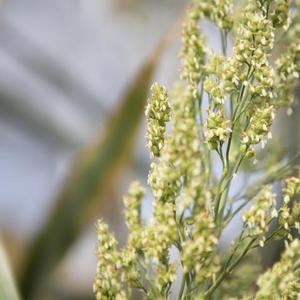DOE awards $13.5 million to enhance sorghum for biofuel




Donald Danforth Plant Science Center
December 23, 2015
BY Donald Danforth Plant Science Center
The Donald Danforth Plant Science Center announced that it will be part of a major collaborative research project to improve sorghum's productivity under resource-limited conditions. The research should lead to strategies to increase plant biomass as well as more water use- and nutrient-efficient sorghum crop systems. The five- year $13.5 million project is funded by the the U.S. Department of Energy and will be led by the University of Nebraska-Lincoln.
Sorghum is a promising biofuels feedstock as it needs less water than corn and thus can be grown on less productive lands. This will enable farmers to continue to grow food crops on the prime real estate, while allowing them to keep marginal lands in use and help kick start the development of a more efficient bioenergy feedstock. This will help the U.S advance a carbon neutral energy market and benefit the rural economy.
Advertisement
Advertisement
"Research at the Danforth Center will complement activities at the consortium of institutes and universities working to understand the complex interactions between soil microbes and plants," said Thomas Brutnell, director of the Enterprise Institute for Renewable Fuels at the Danforth Center. "A major goal of the project will be the identification of soil microbes that help make sorghum more efficient at using fertilizers and water while at the same time maintaining or enhancing photosynthesis."
Using a systems approach researchers will investigate sorghum genetics as well as the soil microbes that interact with plants. The work takes advantage of advances in marker-assisted breeding, metagenomics and computational genomic analysis. Geneticists will search for and study sorghum varieties that use water and nitrogen more efficiently under limited water or nitrogen conditions. At the same time, microbiologists will identify and characterize soil microbes that interact with and benefit sorghum, such as by enhancing nutrient uptake, water-use efficiency and disease protection.
The project's strength is the interdisciplinary depth and expertise of the team, and includes scientists from Washington State University, University of North Carolina-Chapel Hill, Boyce Thompson Institute, Clemson University, Iowa State University, Colorado State University and the DOE-Joint Genome Institute will bring a wide-range of expertise to tackle sorghum production as a whole system. Working together, researchers expect to accomplish far more than is possible at any single institution.
Advertisement
Advertisement
"UNL is delighted to be leading this large project with partners from prestigious institutions," said Prem Paul, UNL vice chancellor for research and economic development. "Only by collaborating across disciplines and institutions can we find solutions to complex challenges, especially those at the intersection of our food, water and energy systems."
Related Stories
The U.S. Department of Energy Bioenergy Technologies Office (BETO) announced up to $23 million in funding to support research and development (R&D) of domestic chemicals and fuels from biomass and waste resources.
The U.S. DOE has announced its intent to issue funding to support high-impact research and development (R&D) projects in two priority areas: sustainable propane and renewable chemicals and algal system cultivation and preprocessing.
Sens. Sherrod Brown, D-Ohio, and Pete Ricketts, R-Neb., in August introduced the Renewable Chemicals Act, a bill that aims to create a tax credit to support the production of biobased chemicals.
The Chemical Catalysis for Bioenergy Consortium, a consortium of the U.S. DOE’s Bioenergy Technologies Office, has launched an effort that aims to gather community input on the development of new biomass processing facilities.
USDA on March 8 celebrated the second annual National Biobased Products Day, a celebration to raise public awareness of biobased products, their benefits and their contributions to the U.S. economy and rural communities.
Upcoming Events










